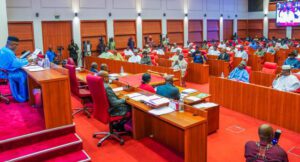Naira declines by 37.6% in January 2024
By Sodiq Adelakun
The Naira experienced a severe depreciation against the US dollar, closing the month of January at an unprecedented rate of N1,455.59. This marked a staggering 37.6 percent decline within a single month.
The previous month of December 2023 saw the exchange rate end at a significantly stronger N907.1 to one US dollar.
However, the situation deteriorated rapidly, with the Naira losing ground consistently throughout January.Parallel market figures were equally grim, with the Naira depreciating by 17.3 percent from N1215 to N1470 against the dollar.
This decline has been attributed to the persistent imbalance between demand and supply in the currency markets, which has put considerable pressure on the Nigerian currency.
The Naira’s downward trajectory began on December 8th, 2023, when it breached the N1000 to one dollar mark, closing at N1099.5.
Although there was a brief period of appreciation, the Naira’s value took a nosedive once again, plummeting to N1,043 by December 28th.
The situation worsened in the new year, with the Naira hitting a record low of N1,089.51 on January 9th, inching closer to the then black market rate of N1,245. Despite trading below the N1000 mark for a brief respite of 12 days, the Naira could not sustain its position and tumbled to another all-time low of N1,348.62 on January 29th.
The rapid devaluation of the Naira has raised concerns among Nigerians, who are now forced to deal with the repercussions of a weakened currency.
The Central Bank of Nigeria has yet to respond to this financial crisis, as the nation watches the value of its currency erode swiftly.
The Central Bank of Nigeria (CBN) has been actively addressing issues of foreign currency speculation and hoarding by Nigerian banks. A new circular introduced guidelines aimed at reducing the risks associated with these practices, noting that some commercial banks hold long-term positions in forex with the hope of profiting from currency depreciation .
The Governor of the Central Bank, Mr. Yemi Cardoso, also recently stated that the naira is undervalued and promised to work towards real price discovery in the foreign exchange market in 2024.
The CBN plans to implement inflation-taming policies and collaborate with the Ministry of Finance to stabilize the exchange rate and curb inflation .
These developments reflect the complexities and challenges in Nigeria’s foreign exchange market, with implications for businesses, individuals, and the broader economy.
Sources with knowledge of the exchange rate opine the depreciation on the official market is part of the apex bank’s attempt to allow the official rate to trade at par with the black market thus eliminating the disparity.
It is expected that this could allow most of the forex supplies in the black market to flow into the official market thus paving the way for stability.
Despite these moves, the major challenge faced by the country remains influx of foreign portfolio investments which many see as the final piece in the puzzle.
However, doing this will require that the central bank increase its benchmark lending rate which is currently at 18.75 percent.




